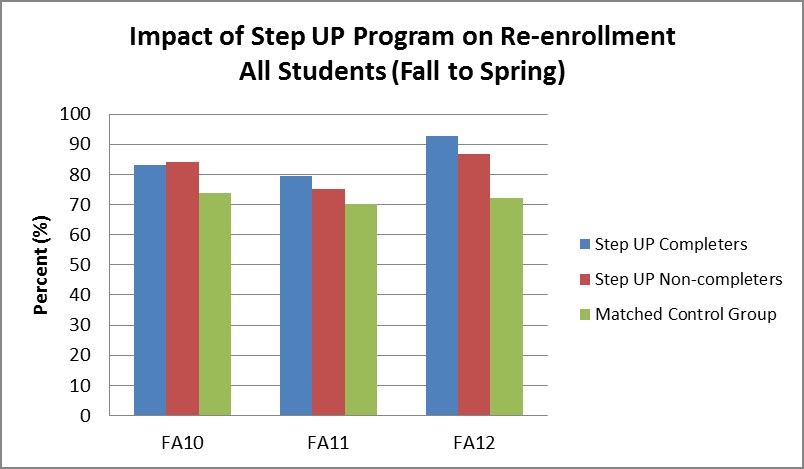Howard Community College: Step UP Program
Step UP is a grassroots program that evolved from the 25 member, cross-functional Developmental Education Committee that, in 2003, sought to create a program to improve the success and retention of developmental education students. The objective was to design a program at Howard Community College (HCC) that would provide positive support and encouragement to students as they make the often difficult transition and adjustment to college. After researching programs and interviewing students, a model for Step UP was created.
The program was piloted with five coaches and students in spring 2005. After a two-semester trial, it seemed that the program might not live up to its promise. However, in spring 2006, significant improvements were implemented. Instead of an open invitation to developmental students to join, Step UP coaches visited developmental classrooms to explain the program and encourage students to participate. The emphasis shifted from focusing on developmental students to inviting all students to participate. Though our largest recruiting efforts are still geared toward developmental students, today any student can participate in Step UP. One of our newest initiatives is reaching out to adult learners and military veterans. Step UP has enrolled over 1,000 students and trained almost 300 coaches to date.
Students who volunteer to participate in the program are randomly paired with a faculty or staff coach who volunteer their time for this effort. Using a life-coaching model, coaches meet with their students once a week for an hour throughout the semester during which time the coach offers support, encouragement, guidance, and attentive listening. The intention is to assure that students in Step UP know that they matter.
One unique feature of Step UP is that coaches receive life-coaching training before they begin to work with students. In addition to the required four-hour training, coaches' workshops are held regularly to build community and teach new coaching skills. One benefit that was not anticipated is the collegiality that has resulted from building a collegewide community of coaches. Coaches come from all constituency groups, including the president, two vice presidents, at least one member of our Board of Trustees, full-time faculty, full-time staff, adjunct faculty, and part-time staff.
Performance Target
For participating students, assessments have included demographic analysis, pre- and post-surveys, focus groups to collect qualitative formative data, and analysis of academic progress. For coaches, assessment consists of surveys, anecdotal stories, training workshop evaluations, and forums to share their ideas for improving the effectiveness of Step UP. Results have been positive and indicate that Step UP students consistently achieve higher GPAs and are retained at a higher level than a matched control group of non-Step UP students.
Term GPA Data
Assessment data have shown that Step UP students generally achieve higher semester GPAs than students in the randomly matched control group.

Random Match Group
The students from Step UP were compared with other HCC students based on five factors: gender, race, academic load, start term, and whether they attempted a developmental class that semester.
Step UP Non-Completers met with a coach at least one time, but did not continue meeting their coach the full semester.
Re-Enrollment
Students who participate in Step UP re-enroll at HCC the following semester at a higher rate than those who do not participate in the program. Here the data for fall to spring semesters reflect increased re-enrollment.

Completion of Courses
One measure of success in learning is whether students complete the courses they have attempted with a passing grade. Statistically, this is measured by the ratio of credits earned to credits attempted. The ratio of credits earned versus credits attempted is higher for Step UP students. For those Step UP students striving to complete the developmental course sequence, this ratio is significantly higher in spring of 2013 compared to matched students without Step UP, and quite an achievement for the students and coaches, as well as the Step UP program.

Contact Jacqueline Dzubak, Instructor of English and Director of Step UP, for more information.
Click here to view the Step UP program video.










